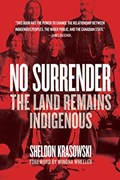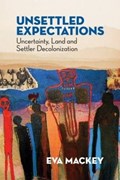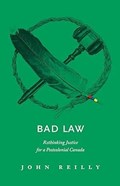Narrow Results By
No surrender : the land remains Indigenous
https://archives.whyte.org/en/permalink/catalogue25009
- Medium
- Library - Book (including soft-cover and pamphlets)
- Published Date
- 2019
- Author
- Krasowski, Sheldon
- Publisher
- Regina, Saskatchewan : University of Regina Press
- Call Number
- 07.2 K85t
1 website
- Author
- Krasowski, Sheldon
- Publisher
- Regina, Saskatchewan : University of Regina Press
- Published Date
- 2019
- Physical Description
- xviii, 368 pages : illustrations, map
- Subjects
- First Nations
- Canada
- Land use
- Landscapes
- Abstract
- Between 1869 and 1877 the government of Canada negotiated Treaties One through Seven with the Indigenous peoples of the Great Plains. Many historians argue that the negotiations suffered from cultural misunderstandings between the treaty commissioners and Indigenous chiefs, but newly uncovered eyewitness accounts show that the Canadian government had a strategic plan to deceive over the "surrender clause" and land sharing. According to Sheldon Krasowski's research, Canada understood that the Cree, Anishnabeg, Saulteaux, Assiniboine, Siksika, Piikani, Kainaa, Stoney and Tsuu T'ina nations wanted to share the land with newcomers--with conditions--but were misled over governance, reserved lands, and resource sharing. Exposing the government chicanery at the heart of the negotiations, No Surrender demonstrates that the land remains Indigenous. (from U of R Press website)
- Contents
- The numbered treaties in historical context : "Our dream is that one day our peoples will be clearly recognized as nations" -- Treaties One and Two and the outside promise : "The loyalty which costs nothing is worth nothing" -- Treaty Three : The North-West Angle Treaty : "I take off my glove to give you my hand to sign the treaty" -- Treaties Four and Five : the Fort Qu'Appelle and Lake Winnipeg treaties, 1874 and 1875 : "The Treaties should be Canada's Magna Carta" -- Treaty Six : the Treaty of Forts Carlton and Pitt : "I want to hold the treaty we made with the Queen" -- Treaty Seven : the Blackfoot Crossing treaty : "The great spirit and not the great mother gave us this land" -- As long as the sun shines : "An everlasting grasp of her [the Queen's] hand."
- ISBN
- 9780889776067
- Accession Number
- P2020-1
- Call Number
- 07.2 K85t
- Collection
- Archives Library
- URL Notes
- Summary on University of Regina Press website
Websites
This material is presented as originally created; it may contain outdated cultural descriptions and
potentially offensive content.
Read more.
Unsettled expectations : uncertainty, land and settler decolonization
https://archives.whyte.org/en/permalink/catalogue25062
- Medium
- Library - Book (including soft-cover and pamphlets)
- Published Date
- 2016
- Author
- Mackey, Eva
- Publisher
- Halifax ; Winnipeg : Fernwood Publishing
- Call Number
- 07.2 M11u
1 website
- Author
- Mackey, Eva
- Publisher
- Halifax ; Winnipeg : Fernwood Publishing
- Published Date
- 2016
- Physical Description
- x, 224 pages
- Subjects
- First Nations
- Canada
- Politics
- Land use
- Abstract
- What do local conflicts about land rights tell us about Indigenous-settler relations and the challenges and possibilities of decolonization? In Unsettled Expectations, Eva Mackey draws on ethnographic case studies about land rights conflicts in Canada and the U.S. to argue that critical analysis of present-day disputes over land, belonging and sovereignty will help us understand how colonization is reproduced today and how to challenge it. Employing theoretical approaches from Indigenous and settler colonial studies, and in the context of critical historical and legal analysis, Mackey urges us to rethink the assumptions of settler certainty that underpin current conflicts between settlers and Indigenous peoples and reveals settler privilege to be a doomed fantasy of entitlement. Finally, Mackey draws on case studies of Indigenous-settler alliances to show how embracing difficult uncertainty can be an integral part of undoing settler privilege and a step toward decolonization. (from Fernwood Publishing website)
- Contents
- Part one. Contact zones and the settler colonial present -- Introduction : settler colonialism and contested homelands -- 1. Genealogies of certainty and uncertainty -- 2. Fantasizing and legitimating possession -- Part two. Ontological uncertainties and resurgent colonialism -- Introduction : unsettled feelings and communities -- 3. Defending expectations -- 4. Settler jurisdictional imaginaries in practice : equality, law, race and multiculturalism -- Part three. Imagining otherwise : embracing settler uncertainty -- Introduction : treaty as a verb -- 5. "Turning the doctrine of discovery on its head" : the Onondoga land rights action -- 6. Creative uncertainty and decolonizing relations -- Epilogue -- References -- Index.
- ISBN
- 9781552668894
- Accession Number
- P2020-1
- Call Number
- 07.2 M11u
- Collection
- Archives Library
- URL Notes
- Summary on Fernwood Publishing website
Websites
This material is presented as originally created; it may contain outdated cultural descriptions and
potentially offensive content.
Read more.
Bad medicine : a judge's struggle for justice in a First Nations community - revised & updated
https://archives.whyte.org/en/permalink/catalogue25142
- Medium
- Library - Book (including soft-cover and pamphlets)
- Published Date
- 2010
- Author
- Reilly, John
- Publisher
- Surrey, B.C. : Rocky Mountain Books
- Edition
- First Edition - revised & updated
- Call Number
- 07.2 R27b 2019
1 website
- Author
- Reilly, John
- Edition
- First Edition - revised & updated
- Publisher
- Surrey, B.C. : Rocky Mountain Books
- Published Date
- 2010
- Physical Description
- 261 p. : map
- Subjects
- Crime
- Education
- Morley
- Snow, John
- Stoney Nakoda
- First Nations
- Contents
- This revised and updated edition details the latest legal developments surrounding tribal leadership and the state of governance on Canadian reserves. When Bad Medicine first appeared in 2010 it was an immediate sensation, a Canadian bestseller that sparked controversy and elicited praise nationwide for its unflinchingly honest portrayal of tribal corruption in a First Nation in Alberta. Now, in a new, revised and updated edition, retired Alberta jurist John Reilly sketches the latest legal developments surrounding tribal leadership at Morley and the state of governance on Canadian reserves, as well as national developments such as Canada’s long-delayed assent to the United Nations Declaration on the Rights of Indigenous Peoples, currently wending its way through the Senate, and the final report of the Truth and Reconciliation Commission. Early in his career, Judge John Reilly did everything by the book. His jurisdiction included a First Nations community plagued by suicide, addiction, poverty, violence and corruption. He steadily handed out prison sentences with little regard for long-term consequences and even less knowledge as to why crime was so rampant on the reserve in the first place. In an unprecedented move that pitted him against his superiors, the legal system he was part of, and one of Canada’s best-known Indian chiefs, the Reverend Dr. Chief John Snow, Judge Reilly ordered an investigation into the tragic and corrupt conditions on the reserve. A flurry of media attention ensued. Some labelled him a racist; others thought he should be removed from his post, claiming he had lost his objectivity. But many on the Stoney reserve hailed him a hero as he attempted to uncover the dark challenges and difficult history many First Nations communities face. (From Rocky Mountain Books website)
- Notes
- Includes bibliographical references (p. 257-258) and index. The Stoney people are comprised of three bands: the Wesley First Nation, the Chiniki First Nation and the Bearspaw First Nation
- Accession Number
- P2020-6
- Call Number
- 07.2 R27b 2019
- Collection
- Archives Library
- URL Notes
- Publication on Rocky Mountain Book's website
Websites
This material is presented as originally created; it may contain outdated cultural descriptions and
potentially offensive content.
Read more.
Bad law : rethinking justice for a postcolonial Canada
https://archives.whyte.org/en/permalink/catalogue25143
- Medium
- Library - Book (including soft-cover and pamphlets)
- Published Date
- 2019
- Author
- Reilly, John
- Publisher
- [Victoria, British Columbia] : Rocky Mountain Books
- Edition
- First edition
- Call Number
- 07.2 R27bl
1 website
- Author
- Reilly, John
- Responsibility
- John Reilly
- Edition
- First edition
- Publisher
- [Victoria, British Columbia] : Rocky Mountain Books
- Published Date
- 2019
- Physical Description
- 231 pages
- Abstract
- From the bestselling author of Bad Medicine and its sequel Bad Judgment comes a wide-ranging, magisterial summation of the years-long intellectual and personal journey of an Alberta jurist who went against the grain and actually learned about Canada’s indigenous people in order to become a public servant. ”Probably my greatest claim to fame is that I changed my mind,” writes John Reilly in this broadly cogent interrogation of the Canadian justice system. Building on his previous two books, Reilly acquaints the reader with the ironies and futilities of an approach to justice so adversarial and dysfunctional that it often increases crime rather than reducing it. He examines the radically different indigenous approach to wrongdoing, which is restorative rather than retributive, founded on the premise that people are basically good and wrongdoing is the aberration, not that humans are essentially evil and have to be deterred by horrendous punishments. He marshalls extensive evidence, including an historic 19th-century US case that was ultimately decided according to Sioux tribal custom, not US federal law. And then he just comes out and says it: “My proposition is that the dominant Canadian society should scrap its criminal justice system and replace it with the gentler, and more effective, process used by the indigenous people.” Punishment; deterrence; due process; the socially corrosive influence of anger, hatred and revenge; sexual offences; the expensive futility of “wars on drugs”; the radical power of forgiveness—all of that and more gets examined here. And not in a bloodlessly abstract, theoretical way, but with all the colour and anecdotal savour that could only come from an author who spent years watching it all so intently from the bench. (From Rocky Mountain Books website)
- Contents
- The beginning -- Learning -- Getting to know the Stoneys -- Restorative justice -- The origins of processes -- The evil Cornwallis -- Milton Born With a Tooth -- The right thing -- Respect -- Paradigm change -- Crow Dog v. Spotted Tail -- Rupert Ross -- Punishment -- Deterrence -- Due process -- Sawbonna -- Rev. Dale Lang -- To forgive or not to forgive -- Anger, hatred, vengeance -- Advocacy vs. conversation -- Polarization -- Drug prohibitions -- Sexual offences -- One size fits all -- Shifting focus from judicial solutions to community solutions -- The TRC -- FAQ.
- ISBN
- 9781771603348
- Accession Number
- P2020-6
- Call Number
- 07.2 R27bl
- Collection
- Archives Library
- URL Notes
- Publication on Rocky Mountain Books website
Websites
This material is presented as originally created; it may contain outdated cultural descriptions and
potentially offensive content.
Read more.



